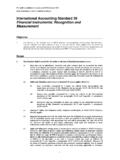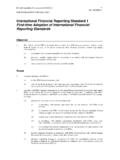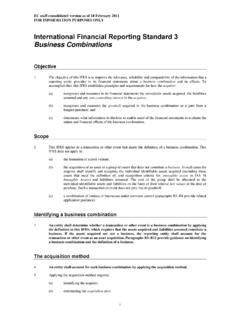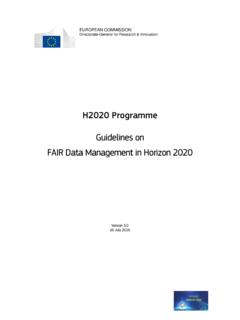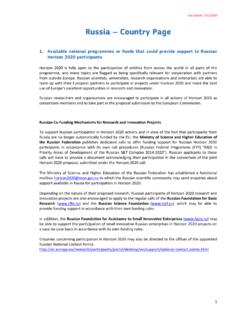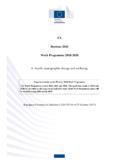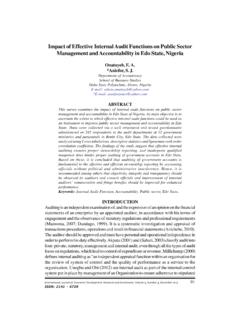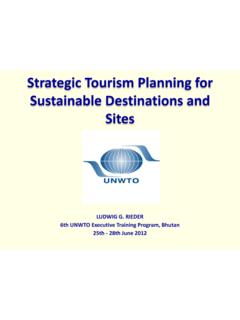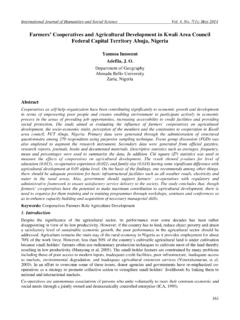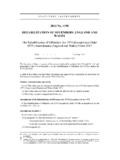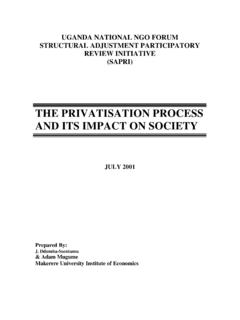Transcription of Commission delegated regulation amending Delegated ...
1 EN EN EUROPEAN Commission Brussels, XXX [..](2018) XXX draft Commission Delegated regulation (EU) ../.. of XXX amending Delegated regulation (EU) 2017/565 as regards the integration of Environmental, Social and Governance (ESG) considerations and preferences into the investment advice and portfolio management (Text with EEA relevance) This draft has not been adopted or endorsed by the European Commission . Any views expressed are the preliminary views of the Commission services and may not in any circumstances be regarded as stating an official position of the Commission . EN 1 EN EXPLANATORY MEMORANDUM 1. CONTEXT OF THE Delegated ACT This proposal is part of a broader Commission 's initiative on sustainable development. It lays the foundation for an EU framework which puts Environmental, Social and Governance (ESG) considerations at the heart of the financial system to support transforming Europe's economy into a greener, more resilient and circular system.
2 ESG factors should be considered in the investment decision making process to make investments more sustainable when taking into account gas emissions, resource depletion, or working conditions. The legislative acts aim at integrating ESG considerations into the investment and advisory process in a consistent manner across sectors. This should ensure that all financial entities that receive a mandate from their clients or beneficiaries to take investment decisions on their behalf would integrate ESG into their internal processes and inform their clients about it. Such requirements would apply for example to asset managers, insurance companies, pension funds, or investment advisors. Furthermore, to help investors compare the carbon footprint of investments, the proposals introduce new categories of low carbon and positive carbon impact benchmarks.
3 These proposals which are mutually reinforcing should facilitate investments in sustainable projects and assets across the EU. The Commission s package follows global efforts towards a more sustainable economy. Governments from around the world chose a more sustainable path for our planet and our economy by adopting the 2015 Paris agreement on climate change and the United Nations (UN) 2030 Agenda for Sustainable Development. The EU is committed to a development path that meets the needs of the present without compromising the ability of future generations to meet their own needs. Sustainability has since long been at the heart of the European project. The EU Treaties give recognition to its social and environmental dimensions, which should be addressed together. The 2016 Commission 's Communication on the next steps for a sustainable European future links the Sustainable Development Goals (SDGs)1 of the UN 2030 Agenda for Sustainable Development to the European policy framework to ensure that all EU actions and policy initiatives, within the EU and globally, take the SDGs on board at the outset.
4 The EU is also fully committed to reaching the EU 2030 climate and energy targets and to mainstream sustainable development into EU policies, as announced in the 2014 Political Guidelines for the European Commission2 by Jean-Claude Juncker. Therefore, many of the European Commission s policy priorities for 2014-2020 feed into the EU climate objectives and implement the 2030 Agenda for Sustainable Development. These include the Investment Plan for Europe3, the Circular Economy Package, the Energy Union package, the Capital 1 The 17 SDGs provide qualitative and quantitative objectives for the next 15 years to prepare ourselves for the future and work towards human dignity, stability, a healthy planet, fair and resilient societies and prosperous economies. 2 A New Start for Europe: My Agenda for Jobs, Growth, Fairness and Democratic Change - Political Guidelines for the next European Commission , Strasbourg, 15 July 2014 available at: 3 Communication from the Commission to the European Parliament, the Council, the European Economic and Social Committee, the Committee of the Regions and the European Investment Bank: An Investment Plan for Europe (COM(2014) 0903 final).
5 EN 2 EN Markets Union4 and the EU budget for 2014-2020, including the Cohesion fund and research projects. In addition, the Commission launched a multi-stakeholder platform to follow-up and exchange best practices on SDGs implementation. Achieving EU sustainability goals requires important investments. In the climate and energy space alone, it is estimated that an additional annual investment of EUR 180 billion is needed to meet climate and energy targets by A substantial part of these financial flows will have to come from the private sector. Closing this investment gap means significantly reorienting private capital flows towards more sustainable investments and requires a comprehensive rethinking of the European financial framework. In this context, the Commission established in December 2016 a High-Level Expert Group (HLEG) to develop a comprehensive EU strategy on sustainable finance.
6 The HLEG published its final report6 on 31 January 2018. This report provided a comprehensive vision on sustainable finance for Europe and identified two imperatives for Europe's financial system. The first is to improve the contribution of finance to sustainable and inclusive growth. The second is to strengthen financial stability by incorporating Environmental, Social and Governance (ESG) factors into investment decision-making). The HLEG issued eight key recommendations, which it believes are essential building blocks of a sustainable European financial system. Among these recommendations, the HLEG calls for the establishment of a technically robust classification system at EU level to provide clarity on what is 'green' or 'sustainable' a so-called sustainability taxonomy. To follow-up on the work of the HLEG and contribute to broader efforts to connect finance with the needs of the planet and society, the Commission published on 8 March 2018 an Action Plan on Financing Sustainable Growth7.
7 It announced that the Commission would amend the Delegated acts under Directive 2014/65/EU on markets in financial instruments (MiFID II)8 and Directive (EU) 2016/97 on insurance distribution (IDD)9 to ensure that sustainability preferences are taken into account in the suitability assessment. The Action Plan also indicated that based on these Delegated acts, the Commission will invite the European Securities Markets Authority (ESMA) to include provisions on sustainability preferences in its guidelines on the suitability assessment to be updated by Q4 2018. In addition, the Commission invited EIOPA and ESMA to provide final technical advice, including cost-benefit analysis, by 30 April 2019 on the integration of environmental, social 4 Communication from the Commission to the European Parliament, the Council, the European Economic and Social Committee and the Committee of the Regions: Action Plan on Building a Capital Markets Union (COM(2015)468 final).
8 5 The estimate is a yearly average investment gap for the period 2021 to 2030, based on PRIMES model projections used by the European Commission in the Impact Assessment of the Proposal of the Energy Efficiency Directive (2016). 6 Financing a sustainable European economy Final Report 2018by the High Level Expert Group on Sustainable Finance, 7 Communication from the Commission to the European Parliament, the Council, the European Economic and Social Committee and the Committee of the Regions: Action Plan: Financing Sustainable Growth (COM(2018)097 final). 8 OJ L 173, , p. 349. 9 OJ L 26, , p. 19. EN 3 EN and governance considerations and preferences in the investment decision and advisory processes. MiFID II became applicable on 3 January 2018 and, together with regulation (EU) No 600/20142 (MiFIR), replaced Directive 2004/39/EC10.
9 MiFID II and MiFIR provide for an updated harmonised legal framework governing the requirements applicable to investment firms, regulated markets, data reporting services providers and third country firms providing investment services or activities in the Union. MiFID II and MiFIR aim to enhance the efficiency, resilience and integrity of financial markets. Under the existing MiFID II framework, firms providing investment advice and portfolio management are required to obtain the necessary information about the client's knowledge and experience in the investment field, their ability to bear losses, and objectives including the client's risk tolerance to enable the firm to provide services and products that are suitable for the client (suitability assessment). The information regarding the investment objectives of the client includes information on the length of time for which the client wishes to hold the investment, his/her preferences regarding risk taking, risk profile, and the purposes of the investment.
10 However, the information about investment objectives generally relates to financial objectives, while non-financial objectives of the client, such as environmental, social and governance (ESG) preferences, are usually not addressed. Existing suitability assessments generally do not include questions on ESG preferences of clients, while the majority of the clients would not raise the ESG issue themselves. As a result, investment firms consistently do not give appropriate consideration to ESG factors in the selection process. This regulation aims at clarifying that ESG considerations and preferences should be taken into account in the investment and advisory process as part of the duties towards clients. This regulation is based on the empowerment set out in Articles 24 (13) and 25 (8) of MiFID II. 2. CONSULTATIONS PRIOR TO THE ADOPTION OF THE ACT The High-Level Expert Group on Sustainable Finance (HLEG) was set up in December 2016 to help develop an EU strategy on Sustainable Finance through recommendations: it published a HLEG interim report on "Financing a Sustainable European Economy" in mid-July 2017 and presented the report at a stakeholder event on 18 July 2017, followed by a consultation questionnaire.
